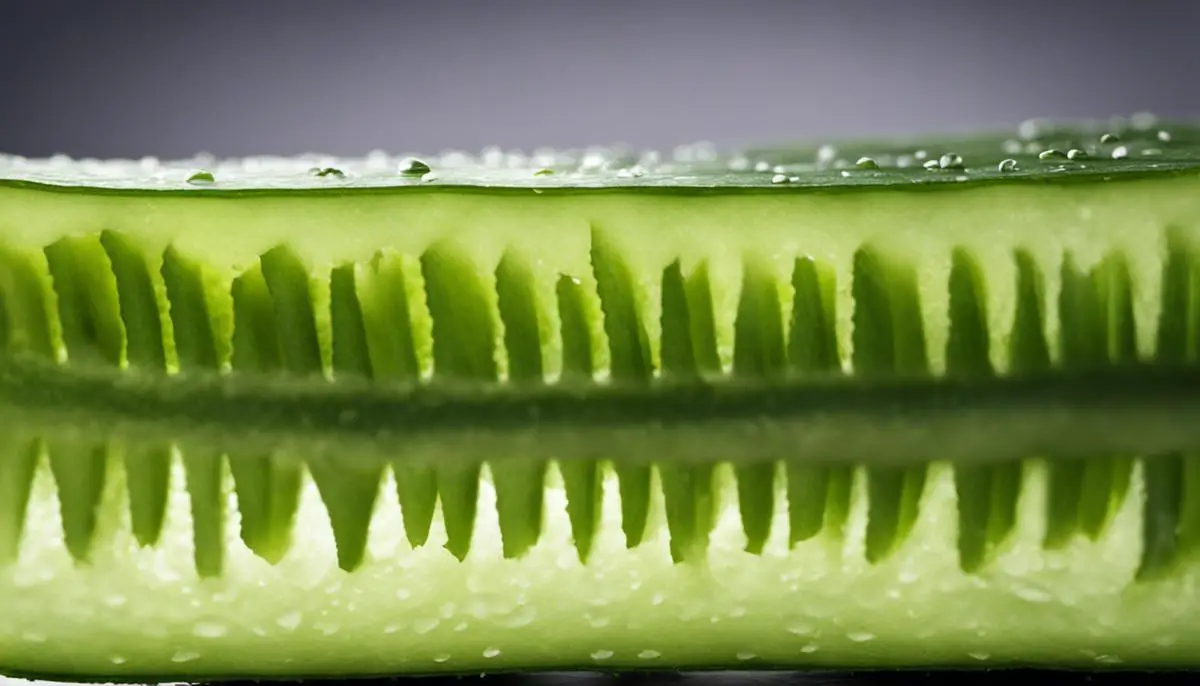Ever bitten into a cucumber only to find it so bitterly disappointing? Cucumbers, prized for their crisp freshness and mild flavor, can occasionally turn bitter, much to the dismay of gardeners and salad lovers alike. This bitter taste is primarily a result of specific compounds known as cucurbitacins, present naturally in the fruit. While these compounds usually exist at lower, virtually undetectable levels, certain environmental conditions and growing practices can cause them to spike, leading to an unpleasantly bitter taste. Understanding the chemistry of cucumbers, and the factors that can heighten the risk of such bitterness can help in not only preventing overly bitter cucumbers but also in treating the bitter ones if one does land up on your chopping block.
Understanding Cucumber Chemistry
Cucurbitacins: The Bitter Chemicals
Cucurbitacins are a class of diverse and highly oxygenated tetracyclic triterpenoids found in most, if not all, members of the plant family Cucurbitaceae, which includes cucumbers. These naturally occurring chemicals are primarily responsible for the bitter taste found in many cucurbits. The taste of cucumbers largely depends on the concentrations of cucurbitacin compounds.
Reader Poll: What online courses would interest you?
How Cucurbitacins Affect Cucumber Taste
The cucurbitacins compounds and their variations are responsible for the bitterness in cucumbers. Research has identified five primary types known as cucurbitacin B, C, D, E, and I. Each type impacts the cucumber’s taste differently, with cucurbitacin C reported as the most bitter among them. When present in high amounts, it can overpower the natural mild flavor of the fruit, causing the cucumber to taste noticeably bitter.
Factors Influencing Cucurbitacins Concentration
Several factors influence cucurbitacin concentrations in cucumbers, with environmental triggers playing a significant role. Stress factors, including high temperatures, uneven watering, or poor nutrition, can instigate the plant’s defense mechanisms, leading it to produce more cucurbitacins and result in more bitter fruit. Moreover, certain cucumber varieties are more likely to have a stronger bitter taste due to genetic predispositions towards higher cucurbitacin production.
Role of Cucurbitacins in Plants
The original role of cucurbitacins in plants likely pertains to their defense against herbivores. These compounds deter plant-eating animals due to their intense bitterness and potential toxicity. Therefore, despite their unpleasant taste to humans, cucurbitacins are critical for the survival and procreation of the cucumber plant in the wild.
Subscribe to our newsletter!
Selecting and Cultivating Less Bitter Cucumbers
If you’re attempting to grow cucumbers, some steps can minimize bitterness. Select varieties known to have lower cucurbitacin levels, such as burpless or English cucumbers. Maintain consistent irrigation, ensuring the plants aren’t overly stressed, and provide balanced nutrient supplies to the plant to help reduce the likelihood of bitterness appearing.
Fruit position on the plant also influences bitterness, with those closer to the stem typically being more bitter than those at the vine’s distal ends. Also, cucumbers harvested at a smaller size tend to be less bitter as well. When it comes to buying, the best way to avoid bitter cucumbers is to sample a small piece before purchase, if possible. Select those that are firm and have brightly colored skin for the least chance of encountering a high cucurbitacin content.
Understanding Cucurbitacins
While most of us don’t enjoy the taste of bitter cucumbers, they aren’t hazardous to our health unless they are extremely bitter, which could cause an upset stomach. That being said, instances of serious health issues from cucumber consumption are uncommon. Interestingly, the bitterness of cucumbers, caused by high levels of a chemical called cucurbitacins, is the subject of scientific studies. Cucurbitacins may have anti-cancer properties, antimicrobial activities, and other potential therapeutic applications, thus, their impact on our health goes beyond merely giving cucumbers their bitter taste.

Factors Leading to Bitterness
What Causes the Bitterness in Cucumbers?
Cucumbers may develop a bitter taste due to environmental stress. Stressful conditions can be brought on by varying factors such as inconsistent temperatures, varying watering practices, and poor soil quality. Cucumbers grow best in warm, not hot, conditions. So, an increase in heat or a drastic temperature drop can adversely affect their growth, leading to an increase in levels of cucurbitacins, which gives cucumbers their bitter taste.
Nimble Nutrition: The need for proper nutrients
A deficiency in essential nutrients could be another reason contributing to bitterness in cucumbers. For ideal growth, cucumbers require a well-balanced diet of essential nutrients. For instance, a lack of enough potassium often results in cucumbers producing a higher level of bitter-tasting chemicals. In addition, cucumbers are heavy feeders, meaning they need lots of nutrients to grow and flourish. A lack of proper nutrition can impede their growth process and cause stress, leading to bitterness.
Water Woes: The role of watering in cucumber growth
Water plays an integral part in the growth cycle of cucumbers. Improper watering, whether over or under watering, can cause stress to the cucumber plant and result in bitter cucumbers. Overwatering leads to water-logged soils that prevent the roots from breathing, while underwatering might leave the plant dehydrated. Both scenarios could lead to the cucumber plant undergoing stress, thereby increasing the production of bitter cucurbitacin compounds.
Pest Problems: Encounters with pests
An influx of pests could also be a major culprit for bitterness in cucumbers. Notably, cucumber beetles and spider mites are known pests that can cause significant damage to cucumber plants, leading to stress and, in turn, bitter fruit. It’s important to regularly control these pests to ensure the health and quality of your cucumbers.
Varietal Value: Impact of cucumber variety on bitterness
Another factor to consider is the particular variety of cucumber you’re growing. Some varieties, especially heirloom and open-pollinated types, naturally tend to be more bitter than others. Conversely, modern hybrid varieties have been selectively bred to minimize the cucurbitacins that contribute to bitterness. Hence, if you’re battling persistent bitterness, it might be worthwhile to consider switching to a different variety.
Stress Impacts Cucumber Taste
Any form of stress experienced by a cucumber plant during its growth cycle can result in bitter cucumbers. This stress can come in various forms such as extreme weather conditions, insufficient nutrients, inconsistent watering schedules, problematic soil, or an onslaught of pests. Ensuring that cucumbers grow in a stable, healthy environment is key to reducing plant stress and thus preventing the development of bitter cucumbers.

Prevention and Mitigation
The Cause of Bitter Cucumbers
The root cause of bitter cucumbers lies in compounds known as cucurbitacins, which are naturally produced by cucumber plants. These chemicals, present in different plant species, provide a natural insect deterrent. Concentrated mainly in the cucumber’s ends and peel, cucurbitacins can impart a strong bitter taste if present in large amounts.
Why Cucumbers Become Bitter
There are several reasons why a cucumber might become bitter. They include environmental stressors like uneven watering, high temperatures, and poor nutrition.
Uneven watering or changes in water availability can stress the plant and lead to increased cucurbitacin production. This means that drought or inconsistent watering practices can directly contribute to cucumber bitterness.
Temperature can also play a significant role. Cucumbers prefer cooler environments and may become stressed when exposed to high temperatures for prolonged periods. This stress can increase cucurbitacin production, leading to bitter cucumbers.
Nutrition management is another factor that can affect the bitterness of cucumbers. Cucumbers have specific nutritional needs, and if they are not met, the plants may respond by increasing cucurbitacin levels.
Prevention
To prevent cucumbers from becoming bitter, gardeners should carefully monitor and regulate their watering, temperature control, and nutrition management practices.
Consistency in watering is key. Expert gardeners recommend deep watering on a regular schedule to maintain an optimal moisture balance for cucumber plants.
Keeping the cucumbers cool is also important. Shade clothes or strategic planting to ensure the cucumbers are shaded during the hottest part of the day can help keep temperatures cool and prevent bitterness.
Finally, proper soil preparation before planting and the addition of balanced fertilizers can keep cucumber plants well-fed and mitigate stress that can lead to bitterness.
Mitigation
If cucumbers have already grown bitter, there are several actions you can take to mitigate bitterness. One common method is to trim off the ends of the cucumber and peel it. Since cucurbitacins are concentrated in these areas, removing them can considerably reduce the overall bitterness of the cucumber.
Another method is to soak the cucumber in salt water for several minutes before consuming. The salt pulls out some of the cucumber’s natural bitter compounds and can make a noticeable difference in bitterness.
In sum, cucumber bitterness results from varying levels of cucurbitacins produced in response to environmental stresses. By controlling these stresses through proper watering, temperature control, and nutrition management, you can reduce the likelihood of growing bitter cucumbers.

The battle against bitter cucumbers doesn’t have to be a hard one. Educating ourselves about the conditions that encourage the production of cucurbitacins and adopting smart gardening practices can greatly improve the taste and quality of your cucumbers. Furthermore, knowing how to manage the bitterness if a cucumber does turn out bitter can save your salads, pickles, or other cucumber dishes from a potential disaster. Ultimately, with the right knowledge and practices, one can confidently grow and consume delicious, satisfyingly crunchy, and non-bitter cucumbers.

